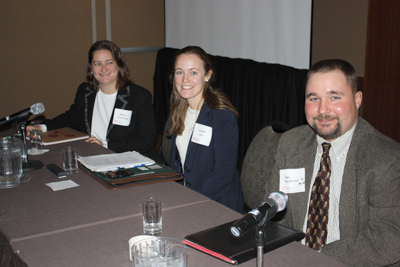Panel focuses on farming in unpredictable weather
By Kate Frazer

With 2012 going down as the hottest year ever recorded in the contiguous United States, it was fitting that a Cornell-led panel titled “Farming Through Unpredictability” kicked off the 181st New York State Agricultural Society forum Jan. 9 in Liverpool, N.Y.
Of course such headlines come as no surprise to New York state farmers who have already been grappling with earlier springs, hotter summers, milder winters and extreme weather events, and adjusting their business practices and management decisions accordingly.
The discussion, moderated by Michael Hoffmann, associate dean of the College of Agriculture and Life Sciences (CALS) and director of the Cornell University Agricultural Experiment Station, explored these issues with farmers Jennifer Crist and Paul Ruszkiewicz ’98, MPS ’00, who shared examples of how they have been dealing with changing weather patterns.
Crist, whose family operates the 600-acre Crist Brothers Orchards in the Hudson Valley, said she has noticed many changes, with earlier springs being the biggest challenge. “Once the buds start developing, apples are much more susceptible to frost damage,” she said.
Crist explained that the impact to her orchard last season varied dramatically based on elevation. “Parts of the orchard had a full crop, while other areas had almost nothing,” she said.
To prepare for frost events, her family has invested in higher elevation sites and wind machines that pull warmer air down to the orchard. They are also experimenting with sun protectants and considering overhead irrigation to cool their orchard on the warmest days.
In looking for new opportunities among the challenges, however, Crist noted that the longer growing season means her family can now grow Pink Lady apples, a variety typically unsuited to Northeast growing conditions.
Ruszkiewicz of Ruszkiewicz Farms in Orange, N.Y., added that his farm has been adjusting operations to deal with major rain events. “Onions are grown on mucky, low-elevation soils; we lost 85 percent of our crop to flooding from Hurricane Irene,” he said. “The flooding was followed by a mild winter, so there was no hard freeze to kill pathogens brought in by the floods. That was another strike against us.”
In response, his family has begun to diversify their plantings, adding squash, pumpkins, corn and soybeans. “With unpredictable weather, you can’t put all your eggs in one basket,” Ruszkiewicz said.
According to Hoffmann, farmers like Crist and Ruszkiewicz are researchers, too, since they are constantly testing new strategies.
“Cornell can play a major role in bolstering actions farmers are already taking,” he said. “We have faculty in horticulture, soil and atmospheric sciences, plant breeding and many other disciplines engaged in research to help farmers both reduce greenhouse gas emissions and adapt to a changing climate.”
Hoffmann noted that CALS researchers are working to develop better cooling for dairies, improved water management, and crop varieties better adapted to high temperatures, while Cornell Cooperative Extension educators help get this research into the hands of those who need it.
Crist said such resources are critical: “Cornell scientists work to get us information relevant to our area – almost day by day. During the spring season, we received daily emails about orchard management.”
Ruszkiewicz and Crist emphasized that other challenges they face as farmers include accessing an adequate labor force, ensuring food safety and dealing with pests and diseases.
“We can’t afford to deal with each problem in isolation,” says Crist. “We value Cornell’s partnership in seeking solutions to all of these challenges.”
Kate Frazer is the agricultural stations communications officer for the College of Agriculture and Life Sciences.
Media Contact
Get Cornell news delivered right to your inbox.
Subscribe